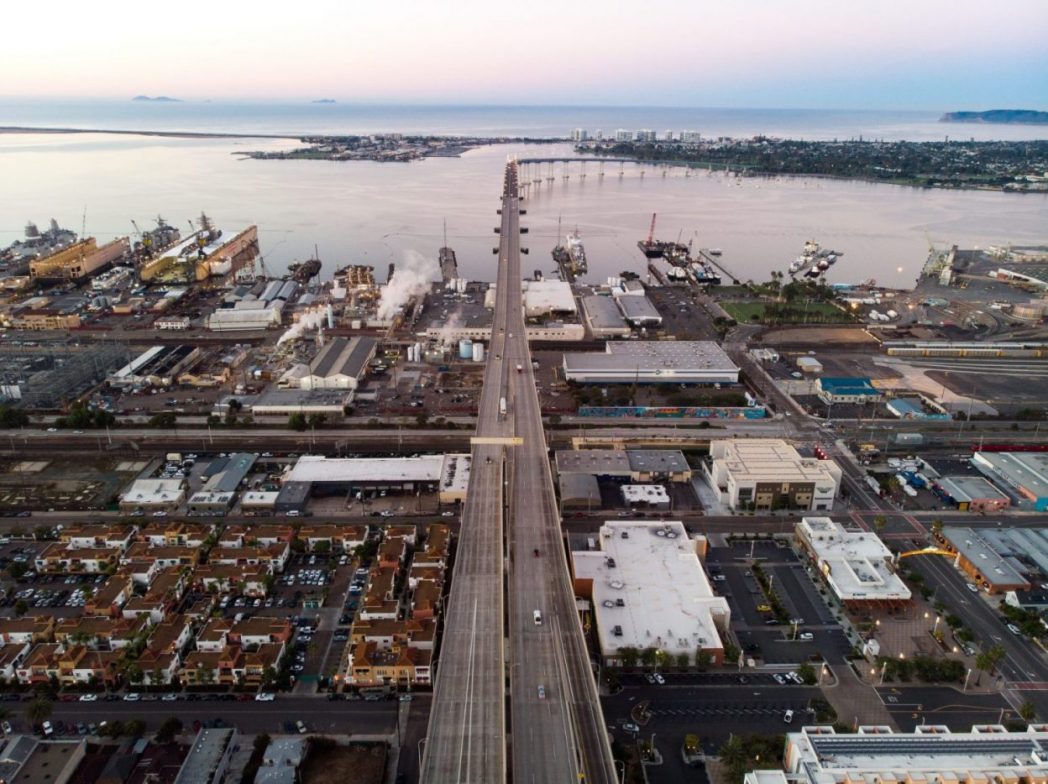
Unsure about the new San Diego APCD Asbestos Rule? Let’s break it down.
The San Diego County Air Pollution Control District (SDAPCD) adopted Rule 1206 in November 2017. This rule revised requirements for asbestos testing prior to renovation and demolition in San Diego.
Not sure how this affects you? Read on to find out!
Who Is impacted?
The short of it, most properties are affected under the new rule. This includes any structure, any institutional, commercial, public, industrial or residential structure, installation, or building (including any structure, installation, or building containing condominiums or individual dwelling units operated as a residential cooperative, but excluding residential buildings having four or fewer dwelling units); any ship; and any ACWM (Asbestos-Containing Waste Material) disposal site.
I Own or Manage a Building; What is Required of me?
Prior to commencement of renovation or demolition operations and prior to submitting the notifications required by Section (e), a facility survey must be performed to determine the presence or absence of ACM, regardless of the age of the facility. Suspect materials that will be removed, stripped, or disturbed by the renovation or demolition operations shall be sampled and analyzed for asbestos content by a CSST or CAC in accordance with Title 8, California Code of Regulations Division 1, Chapter 4, Subchapter 4, Section 1529 and Chapter 3.2, Article 2.6, Section 341.15. The complete survey must remain on the property during demolition or renovation activities. Once the renovation or demolition notification has been submitted, the facility survey shall be made immediately available to the District upon request.
Read Rule 1206 in its entirety.
How do I comply with San Diego APCD Notification Requirements?
| Prior to any renovation or demolition activity, a Notice of Intention must be submitted to SDAPCD along with its corresponding fee. A complete list of fees are delineated in District Rule 40, beginning on Page 12. |
The following is a summary:
1. Renovation Operations (excluding residential buildings having four or fewer dwelling units):
≥100 sq. ft. to 500 sq. ft. = $451
501 to 2,000 sq. ft. = $529
2,001 to 5,000 sq. ft. = $609
5,001 to 10,000 sq. ft. = $671
>10,000 sq. ft. = $746
2. Planned (Annual) Renovation Operations (add to appropriate renovation operation fee listed above) = $90
3. Emergency Renovation Operations (add to appropriate renovation operation fee listed above) = $90
4. Demolition Operations: Regulated Asbestos Containing Material (RACM) sites or Non-RACM sites or sites with no asbestos present =
$535
5. Emergency Demolition Operations (add to demolition operation fee listed above) = $90
6. Revised Notification Fee for Renovations, Demolitions, Planned Renovations, and Emergency Operations (NOTE: a revision is defined as a change in the original start date or when the amount of asbestos changes by greater than or equal to 20%.) = $44
Notify the SDAPCD for demolition or renovation operations subject to the Asbestos Rule by electronically submission, mailing or hand-delivering the notification form to the District at 10124 Old Grove Rd, San Diego, CA 92131 or email. The notification must be postmarked or delivered at least ten working days prior to demolition, asbestos stripping, removal work or any other activity begins (such as site preparation that would break up, dislodge or similarly disturb asbestos material).
In order for the notification to be considered valid it must be complete and accurately filled out with appropriate fees included with all submitted notifications and revisions within one working day of the effective date of the notification. The District now accepts all major credit cards, including Visa, MasterCard, American Express and Discover with a 2.2% service fee. For those paying by credit card, notifications can be faxed to (858) 586-2651.
What Provisions are There for an Unexpected Emergency?
Emergency Renovation or Emergency Demolition notifications shall be submitted and approved by the District prior to the close of business of the next working day after the start of any emergency renovation or emergency demolition.
Rule 1206 defines emergencies under the following conditions:
“Emergency Renovation Operation” means an unplanned renovation operation resulting from a sudden, unexpected event that, if not immediately attended to, presents a safety or public health hazard. This includes, but is not limited to:
(i) Renovations due to fire, water, or earthquake damage; or
(ii) An unanticipated discovery of RACM (Regulated Asbestos-Containing Material) during renovation, demolition, or construction activity; or
(iii) The conversion of previously non-friable asbestos containing material to friable material during the course of a renovation; or
(iv) Operations necessary to protect equipment from damage.
Section (b)(1)(i) of Rule 1206 states that survey requirements do not apply to a facility when:
- The renovation of a facility involving the disturbance of any combination of building materials in any consecutive 365-day period totaling less than 100 square feet on facility components, and less than 20 cubic feet for materials removed from facility components where the area could not be measured prior to removal, stripping, or disturbance.
Where can I find more information?
| More information can be found on the San Diego Air Pollution Control District, including frequently asked questions. The SDAPCD offers a free monthly asbestos training class. It is approximately 3-4 hours long and will cover asbestos requirements in detail. If you are interested in attending, please contact [email protected]. |
Want to learn more? We can provide in-house training on this and many other topics.
Need an inspection to submit to SDAPCD, SCAQMD or any other regulatory agency? We are here to help!
Contact our team at A-Tech Consulting, Inc.
Note: This article is a summary of the new SDAPCD rule 1206 and is not intended to be a comprehensive explanation of this or any other regulatory law applicable to asbestos.
References:
“What You Need to know about the new SDAPCD Asbestos Rule.” SDCAA https://www.sdapcd.org/content/sdapcd/compliance/compliance-requirements/asbestos-program.html


